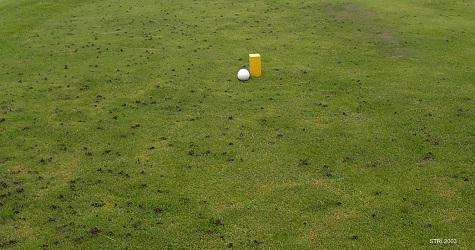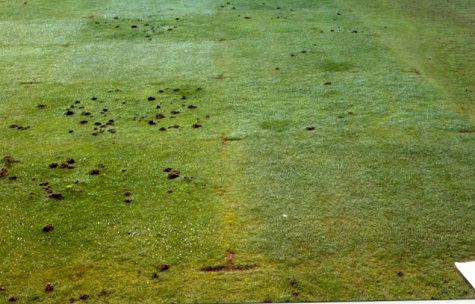Worm casting can be an issue for many grassed areas including sports surfaces, parks and lawns.
There are around 25 native species and up to 34 exotic species of earthworms inhabiting UK soils. They favour moist, less acidic and medium textured soils, especially where organic matter is readily available. There are many benefits associated with earthworm activity, such as breakdown of organic matter and recycling of nutrients. Aristotle referred to earthworms as the ‘intestines of the earth’ due to their ability to digest and recycle nutrients.
However, earthworms are also responsible for producing casts on the surface of the grass. Earthworms can bring 40-50 tonnes of soil per hectare to the surface each year. These casts can have a detrimental effect, for example, if they smear they may seal the surface creating drainage impediment. They may also produce an uneven playing surface (Fig 1) or they bring weeds seeds to the surface and provide them with a seed bed to germinate and establish in. Annual meadow-grass ingress into fine turf surfaces may be as a result of seed dispersal from the rootzone through earthworm movement.

Fig 1: Wormcasts on golf tee
The three main species associated with casting are -:
- Lumbricus terrestris
- Apporrectodea longa
- Apporrectodea calignosa
Currently no lumbricides are authorised for earthworm control. Plant protection products that control worms must be authorised by the Chemicals Regulation Division (CRD) for that purpose. The use of carbendazim was withdrawn in September 2017. Prior to withdrawal, carbendazim was frequently detected in watercourses by water company monitoring, particularly during peak usage periods in the late summer/early autumn. This is a problem because there is a strict drinking water standard for pesticides of 0.1 mg /l (microgrammes per litre) and when concentrations in rivers exceed this value it is costly to remove them.
Additionally, if concentrations are high enough the treatment processes may be breached and result in drinking water being contaminated with trace levels of pesticide. Since the carbendazim withdrawal, several water companies have continued to detect carbendazim, with two companies reporting 84 detections above the 0.1 mg /l limit, with the highest result being above 22 mg /l. Water companies are currently sharing their carbendazim data with the Environment Agency and CRD. Not only is use of any unauthorised pesticide illegal, it could also be impacting on the local aquatic environment.
Therefore, we must focus on cultural control of earthworms. Control of earthworms starts with making the rootzone environment less favourable for them as a habitat. As a food source they will use organic matter, grass clippings, organic fertilisers, leaf litter, etc. Consequently, the less food the earthworm can find, the less likely it will be to remain in that area.
For example, research trials at STRI showed that boxing off clippings on a golf fairway reduced casting by 30%. Earthworms also prefer a neutral to alkaline soil pH. Therefore, encouraging a more acidic rootzone makes the area less hospitable. This can be accomplished using acidifying fertilisers during the growing season, such as ammonium sulphate or application of iron sulphate in late summer or application of pure sulphur. For example, boxing off clippings and applying 50 kg N/yr/ha ammonium sulphate increased the reduction in casting to 48% on the golf fairway (Fig 2).

Fig 2: Reduction in earthworm casts using cultural control methods
Sand top dressing can also be used to discourage earthworms. The more abrasive the sand, the more irritating it can be to the earthworm’s integument (skin). Sand will also help to break down casts more easily on the surface and they will be less prone to smearing.
We need to manage the soil environment to favour the grasses and playing quality whilst minimising impact of earthworm casting. For these cultural control measures to work effectively, we need to adopt a long-term approach as unfortunately they will not produce results overnight.
Visit STRI